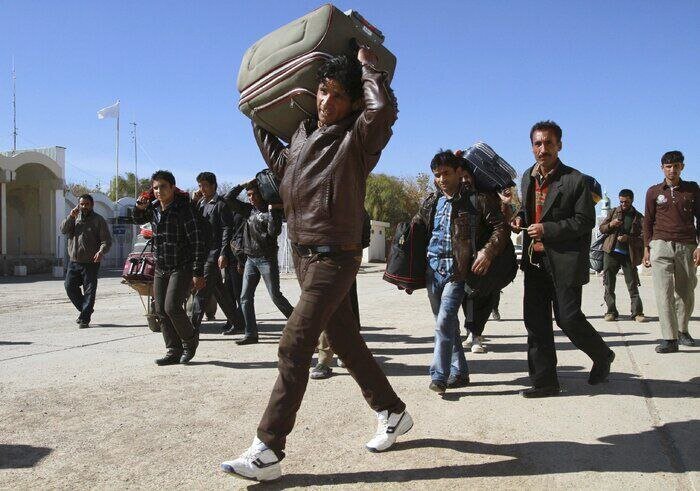
TEHRAN – The voluntary return of undocumented Afghan refugees to their homeland via the Dogharon border terminal in the city of Taibad, northeastern Khorasan Razavi province, has increased by 30 percent since the beginning of autumn compared with summer.
Since the start of the current Iranian year (March 21), more than 1.2 million undocumented Afghans have returned to their home country through this border, yjc.ir quoted Hossein Jamshidi, the governor of Taibad, as saying.
Moreover, the number of identified and deported undocumented Afghan nationals across the country has increased by 10 percent during the same period, the official noted.
The official went on to say that the Dogharon border terminal will soon be equipped with a biometric identification system, the first of its kind in Iran’s border checkpoints.
The system will be used for detecting and preventing illegal entry into the country.
IOM lauds Iran’s services to Afghan refugees
The Senior Advisor to the Director-General of the International Organization for Migration (IOM), Kim Eling, has appreciated the efforts of the country in hosting and providing services to Afghan refugees.
The IOM official met the Iranian Deputy Interior Minister, Mohammad Bathaei, on Monday on the sidelines of the 76th annual session of the Executive Committee of the United Nations High Commissioner for Refugees, held from October 6 to 10 in Geneva, Switzerland.
Commending the country’s efforts in hosting Afghan nationals, Eling said that the reduction in the amount of aid from donor countries is the main challenge for the United Nations in advancing projects.
The Iranian official, for his part, underlined that “despite unilateral coercive sanctions, Iran has provided significant services to foreign nationals.”
Iran hopes donor countries carry their share of responsibility by allocating appropriate aid to projects being implemented in the country, the official added.
Delivering a lecture, meeting the High Commissioner for Refugees, Filippo Grandi, as well as the Special Representative of the United Nations Secretary-General (SRSG) for Disaster Risk Reduction, Kamal Kishore, are among other plans for the Iranian official.
The Executive Committee of the High Commissioner’s Program (ExCom) meets in Geneva annually to review and approve the agency’s programs and budget, advise on international protection, and discuss a range of other issues with UNHCR and intergovernmental and non-governmental partners.
In August, Interior Minister Eskandar Momeni announced that more than 1.2 million Afghan nationals—mostly undocumented migrants—have left Iran over the past year, with the highest number of departures recorded at the eastern borders of Khorasan Razavi province.
Momeni said the country is not planning to deport documented and authorized refugees.
“We are only deporting the two million Afghans who are illegally residing in Iran,” he said.
“Iran is not an anti-immigrant country, as it is hosting six million foreign nationals. Since the beginning of the current Iranian year (March 21), some 800,000 out of the two million undocumented refugees left the country,” ISNA quoted Momeni as saying on July 18.
“These are honorable people who have contributed to the country’s production. Based on regulations, unauthorized refugees must leave the country. If they wish to live here, they have to follow legal procedures,” the official further noted.
MT/MG
Disclaimer : This story is auto aggregated by a computer programme and has not been created or edited by DOWNTHENEWS. Publisher: tehrantimes.com








